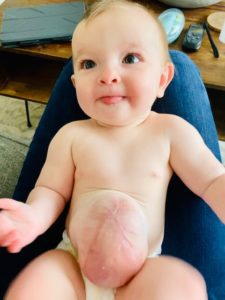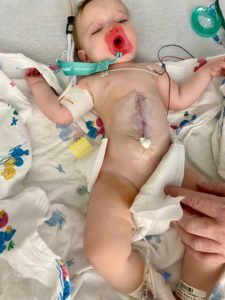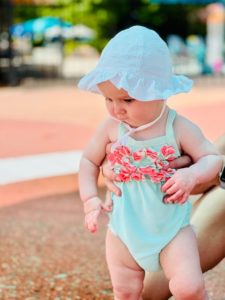When David and Melissa Wickham found out that they were expecting, the pair was thrilled. They had already been together for years – it took seven to conceive their daughter, Maddie – and they were ready to bring their daughter home. But then an unexpected and scary concern popped up during an ultrasound. David and Melissa were told that their daughter would be born with an omphalocele, a rare congenital abnormality. In the family’s GoFundMe, David and Melissa write:
“When we first learned of Maddie’s condition, we were heartbroken for the baby girl we hadn’t yet met, shocked, and unsure what this would mean for her (there are a lot of potential complications and conditions associated with omphaloceles) and our family. But we chose to embrace our new reality and focus on doing whatever needed to be done in order to ensure Maddie was not only brought into this world safely, but that she also had the opportunity to live a happy, healthy life.”
I recently sat down with Melissa to discuss their diagnostic journey, Maddie’s surgery to fix her omphalocele, and the importance of raising awareness.
If you would like to donate to the Wickham family to assist with medical bills and other family needs, please do so here.
What is an Omphalocele?
The Children’s Hospital of Philadelphia (CHOP) explains that an omphalocele is:
“A rare birth defect [and abdominal wall defect] in which the bowel, liver, and other abdominal organs extend into the abdomen near the base of the umbilical cord.”
Normally, the intestines return to the abdomen during fetal development – typically within the first 11 weeks following gestation. However, an omphalocele forms when this process doesn’t happen. Omphaloceles occur in around 1 in every 4,000-7,000 births. In Maddie’s case, Melissa shares:
“Maddie has an opening in her abdominal cavity and organs that should have been on the inside are on the outside. It started out as her bowels and part of her liver being exposed. But as things have changed and moved around, it ended up just being her liver on the outside.”

In some cases, an omphalocele may be confused for gastroschisis. However, infants born with an omphalocele have a thin, transparent sac covering the organs, while those born with gastroschisis do not.
Some infants born with an omphalocele may experience complications, such as:
- Heart malformations
- Chromosomal abnormalities
- Intestines that are slow to handle food and/or difficulty feeding
- Poor lung development
- Beckwith-Wiedeman syndrome
- Frequent infections
However, not all infants experience these complications, nor do these complications last forever in every case. For example, Melissa explains:
“Maddie had some suspected respiratory and cardiac complications, but those have since been resolved. So luckily, the only thing we’re currently still dealing with is the omphalocele.”
Maddie’s Story
After the Wickhams found out about Maddie’s omphalocele, they dove into research. At the time, the family was living in Wilmington, North Carolina. But their research, and the doctors they were working with, scared the Wickhams. Says Melissa:
“Everyone we spoke to was very ‘doom and gloom,’ I think because it was a rare diagnosis. I don’t know if I ever asked my OB/GYN if she had delivered a baby with an omphalocele before, but I got the impression that she had not. So everything we were told was the worst case scenario – that there would be genetic complications incompatible with life, that babies don’t grow well and never make it to term.”
But they kept researching and researching. Eventually, this led David to the UNC Hospital System, located three hours away. Doctors there had much more experience with omphaloceles and gave the Wickhams a much different picture and a much more level-headed outlook. Yes, Melissa would still need to be cautious and yes, there would still be potential risks and complications involved. However, these doctors made it clear that Maddie could not just survive, but thrive.
So David and Melissa made the decision to move closer to the hospital to best prepare themselves for Maddie’s delivery. This necessitated leaving their jobs and their homes, but they knew that they would do anything for their little girl.
In August 2021, Maddie was born via C-section, the safest way to avoid potentially rupturing her liver. David and Melissa knew that she would eventually have to undergo surgery to fix the omphalocele. However, this surgery could be complicated because the liver is such a vascular organ.
Even as they prepared for the surgery, there were some care-related complications associated with Maddie’s condition. For example, Melissa says:
“We had to monitor how she was moving, how much pressure was on her belly at any given time. She couldn’t just move like a normal infant. We couldn’t hold her against our chest because that pressure couldn’t be on her abdomen, so we had to hold and carry her differently. When she started wanting to roll, we had to be super cautious and make sure that she wasn’t going to hurt herself trying to do normal baby things. We had to modify a lot of things you normally take for granted as a new parent.”
The Surgery
On April 14th, 2022, Maddie underwent surgery to repair her omphalocele. The surgery worked to rearrange her organs so that everything – liver included – fit inside of her body. Maddie is still recovering and has required pain medication throughout. David and Melissa are working to slowly wean her off of her meds and normalize sleeping and eating.

During the surgery, her liver was placed back into its expected location. Because it is now protected by muscle, the liver is not as subject to trauma as it was when it was exposed. However, there are residual concerns that may need to be considered in the future. For example, because some of Maddie’s organs were external, her abdomen did not grow to the proper size, nor did her lungs. Melissa explains:
“There is a lot of pressure on her lungs, stomach, and digestive tract. Her heart has shifted. Eating is still an ongoing battle. She can’t eat a lot at one time, so she has to eat more often, but not too much. We’re always in and out of the hospital getting her heart monitored, her body scanned, and making sure everything is doing the right things.”
Outside of Maddie’s medical needs, David and Melissa are also just working to make sure that she can hit milestones and live life like a happy, healthy baby. Because Maddie is immunocompromised, she cannot really go out and have play dates, and daycares are concerned about taking her because of the potential liability. This has necessitated David and Melissa staying home with Maddie, which has been an adjustment. But they still love their daughter and her silly, playful attitude. Currently, Maddie loves dogs, putting toys in her mouth, and hearing her dad make funny sounds.

Now, Melissa and David are fundraising to assist with medical bills and other family needs. When they received their first hospital bill, they became concerned about how they would afford medical care, the surgery – even groceries. So far, the fundraiser has raised an incredible $30,230 – one third of Maddie’s first medical bill.
Please consider donating to the GoFundMe to help the Wickham family as Maddie continues to progress.
Omphalocele Support Systems
In the meantime, as they continue to raise money and take care of Maddie, David and Melissa have found support both in-person and online. Their family has been a huge support system, coming to the family and helping around the house. Melissa explains that an online support group consisting of those with omphalocele experience was a huge help. She shares:
“There is not a lot of information out there and if you Google omphalocele, the results are scary! The information paints a horrible outlook. That’s not to say that there aren’t babies who don’t make it or who pass away after birth, but it’s not the overwhelming majority of babies. This support group gave me accurate information and was a huge help through my pregnancy and through Maddie’s surgery.”
For others who are going through this process, Melissa advocates for reaching out to other families for similar advice and comfort. Outside of that, she says, consider finding a hospital and team of doctors who are familiar with, or even specialize in, omphaloceles:
“Get aligned with them and stick with it. That’s going to be your best bet for your baby, yourself, and your family, both mentally and emotionally.”


